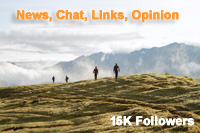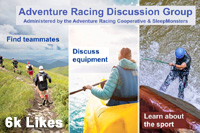The AR World Championships - Costa Rica
Talking to Jacky and Mimi of Thule Adventure
Rob Howard / 10.12.2013


After they had finished a family lunch with their proud parents Jacky Boisset and Mimi Guillot of the Thule Adventure Team talked with me about their second AR World Title win and what it means to them.
First I asked how the team line up came together, as its different to the team that won in Tasmania two years ago. “After the last World Championships we knew Per Vestling and Martin Flinta wanted to step aside from expedition racing, so we knew for a year Stuart would race with us, and soon after that Albert would complete the team.” Said Mimi.
“We had this same team at a race in Idaho before, where we beat Seagate, and Albert and Stu have raced together in Patagonia before and get on well. Plus Albert lives 50km from us in France, so we train together all the time.”
When I asked how the team got along the answer was that they had no problems, but Jacky added, “except when I was not myself.” Mimi was quickly onto the subject of the problems they had at the end of the race and was animated and tearful as she explained exactly what happened.
“We were stuck because Jacky wanted to do nothing and we were close to pulling out of the race 25km from the finish. He didn’t want to ride or move, and at first we just thought we should rest for 30 minutes. But he was no better and was saying strange things and we were more concerned.”
Jacky added, “I don’t remember anything about it. I was confusing reality and a nightmare. I thought I was at home in bed and having a nightmare about being in the race.”
Mimi continued, “I asked him if he knew where he was and who we were, but he had no idea and was still saying strange things. He wouldn’t pedal and we began to try anything we could to move to the finish as we knew we had a good lead. Stuart even tried to carry Jacky on his bike and ride his bike! We tried everything we could think of, pushing him on his bike, walking with him, towing him, but he wouldn’t pedal.
“We were moving 10m at a time and tried to sleep again, but it was cold and rainy. I was talking to him all the time, trying to explain the situation, to remind him it was his dream to win the World Championship again. I was afraid we would pull out and of the disappointment he would feel when he recovered and understood what had happened.
“We managed to move maybe 5km and he recovered a little bit, enough for us to get him on his bike and start moving with the 3 of us supporting him, but he still wouldn’t pedal! We worked together as a team to look after him and it was enough to get us to the transition and to complete the race.”
Given what they’d experienced I asked what their feelings were about the race now.
“It was too much, too hard,” they agreed. “Everything in an adventure race is hard, there is so much to overcome and organise, so many challenges, and in this race there was more than necessary. Stages were a bit too long and extreme. The long trek was in nice mountains and forest but there was 20km on gravel roads at the end. On the first stage we carried the bikes for hours and it was too much. On the trek between the paddling stages we had to carry all our paddle gear and the bags were really heavy and we couldn’t enjoy the trek. We would understand if the course was in wilderness and we had to carry everything to continue the route, but all the time race vehicles were passing us as we walked along the road. It was crazy – they could have taken the paddling gear.
“It must be tough but you want to enjoy where you are and what you are doing. When we go home and explain what we have been doing people cannot believe we want to do it, and other people will not want to do it either. It is not normal to have a portage up a steep hill, no one wants to do that”
Next I asked what the win meant to them.
“I think it is harder to win the second time,” Mimi said. “It is difficult to stay at the top and we were determined to show we were not lucky in Tasmania – that we were well organised and motivated. Then we did not do so well in France last year and were desperately disappointed as the race was in our country. That made us even more determined to win this year.”
“We hadn’t done so well before in World Championship races before Tasmania,” Jacky added, “but that was the first time we had a sponsor to support us with a budget. There are so many things that can go wrong in a race and anything can happen, so we did not expect to win and were happy and a little surprised when we did!”
“It is important to us because it is our job,” said Mimi. “We are passionate about it but it is difficult to explain what we do, and difficult to tell our families why we don’t have a regular job. We are proud to show them here what we do and that it is a good choice. We train hard every day and that is not easy and we prepare so many things with such care. Some people think we are having a fun time travelling, but we are not on holiday!”
Next I asked what they planned for the future and despite the fact Jacky had his swollen and torn feet up on the arm of the chair his immediate reaction was, “We want to go for the hat-trick next year in Ecuador!”
“We are so motivated for that race,” said Mimi. “We have raced there before and it is an amazing country plus we know and trust the race organisation to put on a good event.”
But then came the cloud on the Thule Adventure horizon.
“But it depends on the new nationality rules,” said Mimi. “We have an international team and that is because we race with people we know and like, and want to race with. They are our friends, and it does not matter where they were born or live. To race well you have to be with those you trust and think of as family and if we lose that in our sport it will be bad – it is the most important thing. We don’t want to race with someone just because they are French and so are we.
“I think if you asked Nathan Fa’avae why he races with his team it is not because they are all from New Zealand, it is because they are all friends and get along well.”
Jacky added, “If teams have to be from one country we are not sure we can even continue in adventure racing – it adds too much difficulty to a sport that is already so difficult.”
It seems the future for Thule Adventure is uncertain, in adventure racing at least, though they are committed to multisport racing in China where they have been very successful and Jacky told me he plans to try obstacle racing next year. For the moment though the two French racers are content to enjoy their win and being in Costa Rica with their families.
“This is the best time,” said Mimi, “all of our adventure racing friends are here together now for a little while and we can spend some time with them.”
[Jacky and Mimi also said how important SleepMonsters had been to them over the years of their racing career, and how they’d spent many hours reading the calendar and race reports, looking for inspirational races in amazing places that they could go to. On a personal note that was nice to hear.]
You can read more about Mimi and Jacky at http://www.myriametjacky.com/ and about the Thule Adventure team at http://www.thuleadventureteam.com/







 SleepMonsters
SleepMonsters



